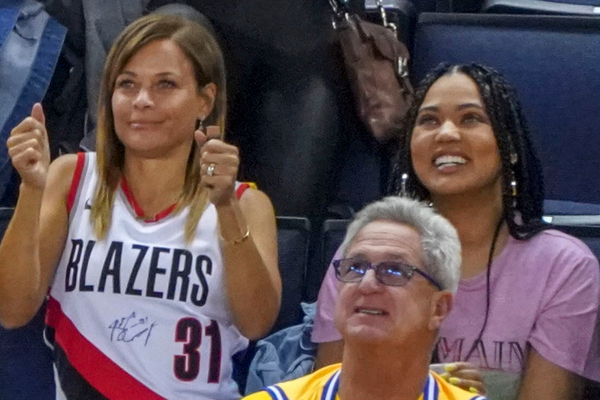
via Imago
Image Source: Imagn

via Imago
Image Source: Imagn
With eyes that shined bright—not through happiness, but a hint of tears—Sonya Curry made a heartfelt admission: “I’ve dealt with depression. I’ve dealt with severe anxiety.” Growing up in extreme poverty in a rural Black community in Virginia, for Sonya, her life was always about fighting through fires, incessant bullying and racism. She vividly recalls when, in the 1960s, she and her mother, Candy Adams, had to walk 5 miles to get to the nearest All-Black school. “We didn’t think it was that bad then. When I tell people today, they say how horrible it was. But it was normal to us. We didn’t know any better.” But her struggles didn’t end there..
Sonya remembers being assigned as a scorekeeper at age 11, for her family’s all-Black women’s softball game against an all-white team. Before the game, a person, dressed in a white hoodie, entered the field and lit a cross on fire. “I guess it was a fear tactic,” Stephen Curry‘s mother said. While the act resulted in a brawl breaking out between the two teams, and the game being cancelled, the memory imprinted itself in Sonya’s mind, in a rather painful way. But the little girl did everything to fit in.
At Radford High, which reportedly had a Black population of “less than 1 percent”, Sonya took up sports (volleyball, basketball, and track and field), just to shield herself from the racism. “You had to play sports. I had to be the best to force them to play with me.” In the end, she did fit in. Sonya Alicia Adams outdid her white peers, got accepted into Virginia Tech, got a degree in education, and became the first college student and graduate in the family. But despite the success, the struggles have left a lasting remark in her life…
ADVERTISEMENT
Article continues below this ad
Sonya Curry made an appearance on ‘The Travis Hearn Podcast’, on January 2, where she described “her journey through the fire” and talked about battling an identity crisis. At one point, Hearn—who also serves as the Phoenix Suns’ team pastor—asked, “You talked about, like, ‘I didn’t really fit in with this group. But I didn’t necessarily fit in with this group either. I almost felt like, Where’s my role? Or where do I fit?’ And I think, even outside of race or ethnicity, a lot of the world feels like that…How did you work through that as a young woman; as a young girl?”
To this, the 58-year-old admitted, “I just did the best that I could do. Like most people do. It’s trial and error…Even in high school, and you know, you weren’t given the classes but I was on teams with other girl teammates…So I would see what classes they were taking. And I would go to the council and say, ‘Why am I not in this class?'”
“I didn’t even know why I wanted that class. I wasn’t interested in it. But I was like, ‘They’re in it for a reason.’ Because they are going to be doctors, they’re going to be lawyers. They’re aspiring to be something…I was good in athletics…that’d be good to get a scholarship. And so I was like, ‘Alright, I’m gonna do what they’re going to do so I can get a scholarship’.” As it turned out, the excuse did not work. However, it did reveal an important fact to Sonya about herself.
“So I was always watching other people walk in their purpose. Like they had a plan. So I was just emulating. I really wasn’t believing it for myself. I was just copying it. And so a majority of my life really has been kind of doing that….I’ve felt most of my life like I was walking around with Imposter Syndrome.”
“I didn’t believe it. I just performed and the older I’ve gotten now, that’s starting to catch up with you a little bit. Because you go through a lot of changes…I went through the divorce and been in the NBA for years. And so a lot of things that became attached to me as my identity through performance have gone away. And now I’m like, ‘Okay. What truly has been my purpose other than performing as a parent, performing as an NBA wife? God, what is my purpose?’ Up until two weeks ago that was that was me.”
Notably, Imposter Syndrome is not a rare phenomenon, especially when it comes to students. According to an article by the NIH, a series of 62 studies conducted back in 2020, to conduct a systematic review of the evaluated prevalence of Imposter Syndrome, showed that prevalence rates were as high as 56% to 82% in graduate students, college students, nurses, medical students, and people belonging to other professions. From personality and setting to social media and upbringing, several factors reportedly play a role in individuals developing this psychological experience.
For Sonya, her experience in school, and eventual divorce, were confusing times. Today, however, having written her book, speaking out about her truth on podcasts, and even hosting one herself, Sonya seems to have found her niche. While it is not for us to state whether she has fully let go of this psychological belief, acknowledging the truth is the first step to betterment.
“And God is doing something right now—I’m not going to get emotional thinking about it. It’s like I’m in a fire. I’m in an identity crisis fire of: I just want to know who I am. And I just want to be that. I have this hunger to just be who he created me to be,” Sonya Curry admitted.

USA Today via Reuters
Jun 10, 2022; Boston, Massachusetts, USA; Golden State Warriors guard Stephen Curry (30) celebrates with his mother Sonya Curry after beating the Boston Celtics during game four of the 2022 NBA Finals at TD Garden. Mandatory Credit: Kyle Terada-USA TODAY Sports
Having said that, Sonya is not alone in her experience with Imposter Syndrome….
Ayesha Curry revealed receiving some help to reduce her “imposter syndrome from a culinary perspective”
Over the years, Stephen Curry’s wife, Ayesha, has gone out of her way to create her own identity. While she has worked in movies and continues engaging in charity work, the thing that stands out most about the 35-year-old is her culinary experience.
The Warriors player may carry the ‘Chef Curry’ moniker, but Ayesha works best with food, having earlier invested in her own wine brand and cookware line, along with having penned cookbooks titled ‘The Seasoned Life’, and ‘The Full Plate’, both New York Times Bestsellers. Unfortunately, the fact that she didn’t receive any formal culinary training caused her to develop symptoms that pointed toward Imposter Syndrome. It wasn’t until she collaborated with a celebrity chef that Ayesha received help for her psychological experience.
“And then I met my business partner and mentor, Michael Mina, who I’ve gone into the hospitality business with and who has been my… He helped me lessen my imposter syndrome from a culinary perspective because I was so hard on myself that I didn’t go to formal culinary school” said Ayesha during a December 2024 interview with Inc.
ADVERTISEMENT
Article continues below this ad
“I did culinary programs and things along the way, but never went to formal culinary school. And he was like, ‘You’re in the best school here that you could be in. You’re learning every day. That’s all that matters.’ And so he really instilled in me that I belonged in that industry, and I’m forever grateful to him.”
Ayesha and Michael Mina, together launched ‘International Smoke’, a restaurant chain that specializes in dishes like wood-fired steaks, seafood, ribs, and vegetarian entrees. Once they launched it in November 2017, the restaurant fully booked reservations until February! As of October 2024, ‘International Smoke’ is present in two locations: Las Vegas, and Ayesha’s hometown of San Francisco.

USA Today via Reuters
February 19, 2022; Cleveland, OH, USA; Golden State Warriors guard Stephen Curry (30) and wife Ayesha Curry (right) during the 2022 NBA All-Star Saturday Night at Rocket Mortgage Field House. Mandatory Credit: Kyle Terada-USA TODAY Sports
Through this collaboration, Ayesha Curry did not just receive a business partner, but a mentor.As for Sonya Curry, we’re sure better things are coming for her too…
ADVERTISEMENT
Article continues below this ad
ADVERTISEMENT
ADVERTISEMENT
ADVERTISEMENT
ADVERTISEMENT

